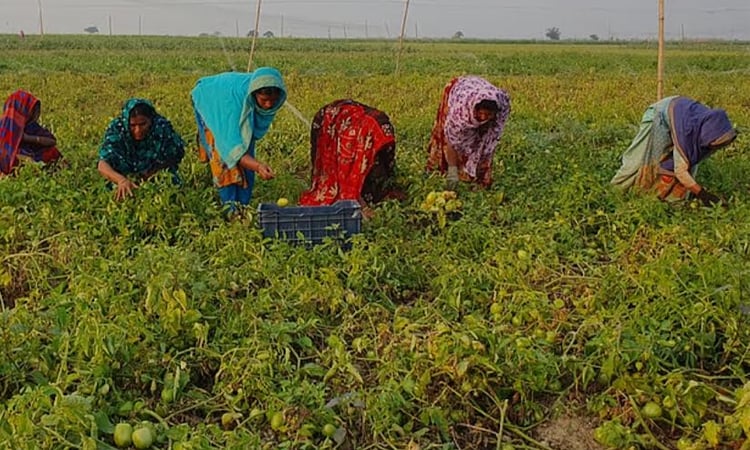News Flash
News Flash

By S M Zahid Hossain
KHULNA, Oct 22, 2025 (BSS) - Once a poverty-stricken and disaster-hit area, Dakope in Khulna's coastal belt is witnessing a quiet transformation through climate-resilient farming.
Salinity, cyclones, tidal surges, and flood-damaged crops once made survival a daily struggle in villages like Chardanga, Tildanga, Kamarkhola, Moshamari, Botbunia, Joynagar, Hogalbunia, Moukhali, and Rekhamari.
At present, these areas are turning green with thriving fields and fish ponds, bringing hope and livelihoods to local communities.
At the center of this change are women farmers, who are not just adapting but leading the shift.
Walking through Chardanga, fields of bottle gourd, okra, pumpkin, tomato, chili, and eggplant now surround sparkling fish enclosures - a stark contrast to the submerged, barren land of just a few years ago.
Shanti Rani Mondal, a housewife-turned-farmer from Chardanga, told BSS, "We used to struggle for food and clothes. My husband was a day labourer, and I stayed home doing nothing. Now I lease land, grow vegetables and fish, and earn an income. I feel proud to contribute."
She learned climate-resilient farming techniques, including using organic fertilizer on saline soil and planting crops along embankments to reduce cyclone damage, through training provided by the local NGO Jagroto Jubo Sangho (JJS).
"We work together with other women in the village to build better lives," she added.
Over 4,000 women across Dakope and neighboring Koyra upazila are now self-reliant, leasing land, cultivating vegetables, and raising fish for local markets.
Tildanga Union Parishad Chairman Jalaluddin Gazi said, "Nothing used to grow here due to salinity. People migrated elsewhere. After introducing climate-resilient farming, agriculture has returned, income has increased, and people are coming back."
He added that literacy rates have also improved, and families now show greater cooperation.
Md Rafiqul Islam, Additional Director of the Khulna Agriculture Zone, noted, "We focus on diversifying coastal livelihoods so that people recover quickly after disasters. Farmers receive saline-tolerant seeds, organic fertilizer, water management tools, and training."
Many women now earn Tk 15,000-20,000 per month by selling vegetables locally.
Farmers in Dakope cultivate saline-tolerant rice varieties alongside vegetables and fish in an integrated farming system, creating multiple income sources.
Farmer Soma Lata said, "Earlier, we lost crops every year to cyclones. Now, climate-smart farming has reduced our losses, and growing vegetables with fish has doubled our income."
Local markets in Dakope are now bustling every morning with women selling fresh produce - a scene unimaginable a decade ago. Families can afford education for their children, and social issues such as petty crime have declined.
Women like Shanti Rani and Soma take pride in sending their children to school with money earned from their own work. "We used to live in hardship. Now we sell crops and send our kids to school. That's our pride," said Soma.
As women's incomes grow, so does their influence in household decision-making and community life. Once seen as dependents, they are now key contributors to family stability.
According to the local agriculture office, vegetable and fish production in Dakope has increased by about 55 percent over the past five years, largely due to climate-resilient practices.
Experts, however, stress the need for continued support, including durable embankments, improved water management, storage, market facilities, and post-disaster recovery funds.
Md Monirul Islam, professor of Agrotechnology at Khulna University, said, "Farmers now have knowledge and motivation. With government support for embankments and inputs, Dakope can become a national model of climate-resilient agriculture."
As the sun sets over Chardanga, Shanti Rani walks home with a basket of vegetables. "Storms will come, rains will come - that's our life. But now we know how to rise again, how to grow again," she said.
The story of Dakope reflects Bangladesh's resilience and hope in the face of climate change.